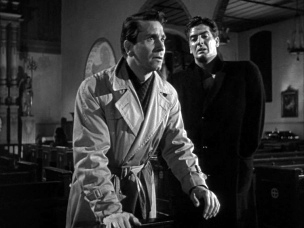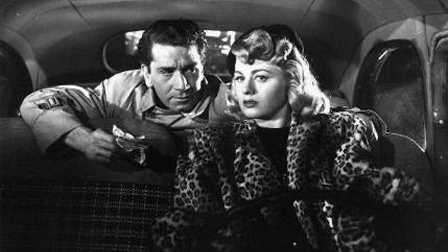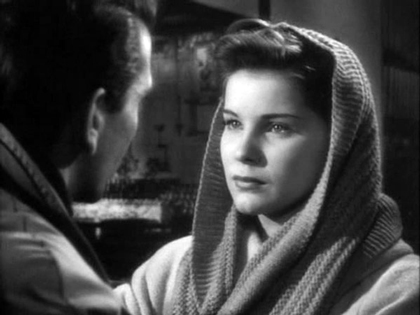|
|
Reviewed by Glenn Erickson
One of the best of Fox's late-'40s film noirs and an underappreciated achievement by director Robert Siodmak, 1948's Cry of the City is tops in every department. It has what may be Victor Mature's best performance, atop a cast of interesting actors in truly memorable parts. Best of all, the story draws together a number of key crime movie themes -- the immigrant experience, the comparison of cops to crooks, the parasitical, treacherous nature of crime -- without resorting to clichés or a story gimmick. Although only partly filmed on the mean streets of New York, it has the full flavor of the era's prominent docu noirs.
People forget that Robert Siodmak enjoyed one of the best runs of success of any director in '40s Hollywood; when he decided to return to Europe in the 1950s it was apparently a wholly voluntary move. A decade before, Siodmak had been indirectly responsible for launching Billy Wilder, Edgar G. Ulmer and Fred Zinnemann as directors... his efforts got their collaborative movie People on Sunday into motion. 1

Ten years ago Fox put out a great series of Fox Film Noir discs, most of which are reviewed here at DVD Savant. Legal or title issues apparently slowed the release of a few, notably Elian Kazan's superior Boomerang! which took several years to show up. But Fox Film Noiir never did release Cry of the City. It has finally appeared on the MOD, DVD-R Fox Cinema Archives label. For noir fans, it's sort of a must-see.
The modestly framed story of the criminal Martin Rome (Richard Conte) shows the full spectrum of corruption and waste caused by crime. After killing a policeman, wounded crook Martin Rome barely survives. Lts. Candella and Collins (Victor Mature & Fred Clark) visit him in the prison ward. They also suspect Rome for a lucrative jewel robbery, and want to know who his female accomplice was. Rome claims his innocence; the cops already have another man in jail for that job. Candella puts pressure on Rome's family to find Teena Riconti (Debra Paget), Rome's current girlfriend. Although Rome's father (Tito Vuolo) disowns him, his mother Mama Roma (Mimi Aguglia) defends Martin. His impressionable younger brother Tony (Tommy Cook) aggressively rejects Candella's request for help. Crooked lawyer Niles (Berry Kroeger) tries to trick Rome into confessing to the robbery, only to foolishly admits that he is in possession of the stolen jewels. The resourceful Martin Rome makes plans to break out of prison, take the loot from Niles and flee the country with the naïve Teena in tow. And he's got little Tony to run errands for him. The determined Candella is already two steps behind.

Cry of the City shows Robert Siodmak's talents at full strength. Perhaps responding to Fox's new semi-docu 'look', he doesn't push the expressionist touches as strongly here as in his earlier Criss Cross and Phantom Lady. As is usual Siodmak makes full use of his cast, providing career-best opportunities for familiar faces. Actress Betty Garde is known in roles as prison inmates or guards -- here she's a tough nurse who develops a soft spot for Martin Rome, who has no qualms about putting her in legal jeopardy. The same goes for Walter Baldwin as Orvy, a slightly addled old prison trustee who has figured out an easy escape route. Baldwin is terrific -- his character even gets a satisfying exit laugh. Viewers will remember Baldwin as the heartbroken father of the crippled sailor Homer in The Best Years of Our Lives. Berry Kroeger usually plays one-note slimeballs, like the crooked carnival owner Packy in Gun Crazy. He comes off as an actor with a broad range of abilities.
Cop Fred Clark has an amusing scene where he eavesdrops on a suspect phone call, only to be frustrated when the caller speaks in Italian. We know Clark mostly as a comedy foil in later TV and film work. Judging by his excellent contribution here one would expect him to stay in drama. Debra Paget is an obvious standout in her first film. She's only on screen a minute or so and all she really delivers is a pretty face. In the important unbilled role of Rome's mother is Mimi Aguglia, a stage legend who is also the mother of Argentina Brunetti. They would play mother and daughter in The Brothers Rico, again opposite Richard Conte. Ms. Aguglia embodies the immigrant spirit without the usual clichés. The only ethnic mistake is young Tommy Cook, who projects a good punk attitude, sneaking past the cops and serving as a decoy so that Martin can move freely. But when Cook is called upon to speak Italian, his pronunciation is terrible.

Cry of the City has two more great performances. Is it agreed that Shelley Winters' breakout role was in 1947's A Double Life? Here she has a solid ten minutes as Brenda, a showgirl who hides Martin Rome in her car and finds him a doctor (Konstantin Shayne). She must dodge cops while dealing with a drunken masher (Howard Freeman) who tries to pick her up in a bar. Brenda delivers Rome to the film's most original character, one too unique to be a grotesque. Performer/masseuse/burglar Rose Given is a huge woman with a hard, suspicious face, and the talented Hope Emerson plays her to the hilt. In a much commented-on expressionist shot, Rose walks in silhouette through several dark rooms to greet Rome, like a spider emerging from its lair. Tough guy Martin is nursing several bullet holes and is as weak as a kitten; one of the movie's highlights occurs when Rose suddenly clasps her enormous hands around his neck as if to strangle him. She makes his neck seem as fragile as the stem of a plant. Rome's been intimidating people for almost an hour, and it's amusing-frightening to see Rose counter his every sneaky move -- often with a pistol in one hand.
Progressive cops 'n' robbers shows set in immigrant communities often proposed the notion that 'only chance' sends one kid (Pat O'Brien?) to the priesthood while his best buddy (Jimmy Cagney?) becomes public enemy #1. Author Henry Edward Helseth and screenwriter Richard Murphy discard this idea early on. Candella shuts down Rome's excuse of a tough background, as he also grew up in the same slum environment, and personal choices made the difference in their lives. It is common for latter-day crime pictures (I would call them thematically lazy) to equate thief and cop as soul brothers, opposite sides of the same coin separated only by a hazy morality or an abstraction called The Law. Cry of the City puts both Rome and Candella through parallel situations. Both are shot, for instance, and both bolt from their hospital beds out of desperation and obsession. All men are brothers, but Rome and Candella aren't part of some half-baked theme that equates cop and crook.
The movie doesn't say that the system is flawless -- the fact that corrupt attorneys like Niles and abusive jailers like Ledbetter (Roland Winters) can prosper paints a realistic picture. Martin Rome may be charismatic but he's also selfish and reckless, a true menace. He brings despair and grief to his family, and as Candella points out, ruins the lives of a whole string of people that choose to give him aid.
What makes all this noir? It's Candella's obsessive pursuit of Rome. Candella wields the sword of society, and shows no sign of mercy for those that knowingly break the law, even sentimental individuals like Brenda, or weaklings like Rome's nurse, or the poor doctor desperate for money to take care of his wife. Only the punk kid and the innocent girlfriend are spared. "The law doesn't want you, Teena." The law does want Rome, and Candella does not hesitate to act when it looks as if Rome will escape once again.

Victor Mature's career had been rescued by noir pictures, starting with I Wake Up Screaming; several years later he returned in the popular Kiss of Death. Richard Conte had played soldiers and hoods until he attracted special attention as the prisoner Wiecek in Call Northside 777, an even more popular show. Conte carries much of Cry of the City, which became his entry into leading-man roles in the pictures House of Strangers and Thieves' Highway. New York Confidential, The Big Combo and The Brothers Rico. Conte's screen image was synonymous with crime noir, so much so that he carries the aura of a "past master" in his role in The Godfather.
The 20th Century Fox Cinema Archives DVD-R of Cry of the City is an excellent encoding of this B&W show. Whatever held up the disc release wasn't a technical problem, as the presentation is almost perfect. Some back-lot scenes pass for the lower East side, but the show doles out a couple of iconic shots that strongly express the flavor of New York. In the best, we watch elevated trains pass one another (the 3rd Street El?) and then tilt down to see Hope Emerson's Rose Given walking in the sun, in a big hat and heavy coat.
Fox saved money at this time by re-using Alfred Newman's Street Scene fanfare and theme on a string of New York-set crime/noir dramas. The music is so attractive that we don't resent the fact that the film is without a truly original score. It sounds appropriate, and belongs, as if all of the films it graces were part of the same series.
On a scale of Excellent, Good, Fair, and Poor,
Cry of the City rates:
Movie: Excellent
Video: Very Good +
Sound: Excellent
Supplements: trailer
Deaf and Hearing-impaired Friendly? N0; Subtitles: None
Packaging: Keep case
Reviewed: October 22, 2013
Footnote:
1. Unsolicited sidebar discussion: Nobody ever explains exactly why the famed Billy Wilder (reportedly) detested his older brother W. Lee Wilder, who entered Hollywood producing mostly inferior films. Before coming to America, Billy Wilder was a screenwriter on Der Mann, der seinen Mörder sucht, Robert Siodmak's commercial directing breakthrough in Germany. It's a gimmick-laden thriller about a guy who wants to commit suicide by hiring a hit man, and then tries to call off the hit. One of W. Lee Wilder's few professional-looking efforts is a 1947 movie called The Pretender, which closely copies this story's original idea. Maybe that's why Billy was so down on his brother.
Return

DVD Savant Text © Copyright 2013 Glenn Erickson
See more exclusive reviews on the Savant Main Page.
Reviews on the Savant main site have additional credits information and are often updated and annotated with reader input and graphics.
Also, don't forget the
2011 Savant Wish List.
T'was Ever Thus.
Return to Top of Page
|


